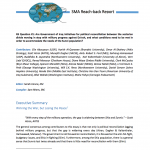Political and Military Progress in Iraq

Question (R3 #1): Are Government of Iraq initiatives for political reconciliation between the sectarian divide moving in step with military progress against Da’esh, and what conditions need to be met in order to accommodate the needs of the Sunni population?
Author | Editor: Canna, S. (NSI, Inc).
Winning the War, but Losing the Peace
“With every step of the military operation, the gap is widening between Shia and Sunnis.” – Scott Atran, ARTIS
The general consensus among contributors to this essay is that not only is political reconciliation lagging behind military progress, but that the gap is widening every day (Atran, Dagher & Kaltenthaler, Hamasaeed, Mansour). The government is not focused on reconciliation, it is focused on the anti-ISIL fight, budgetary issues, and Shia in-fighting (Slim). Furthermore, among the Shia population, there is a general sense that Sunnis lost twice already and that there is little need for reconciliation with them (Slim).
So why are national reconciliation efforts failing? It is not due to lack of initiatives; in fact, there are so many that they are perceived to be more like pronouncements rather than planned, meaningful efforts (Abouaoun, Al-Qarawee, Ford, Wahab). Furthermore, many of these initiatives are being led by international organizations (Liebl). Lack of meaningful national reconciliation efforts have convinced some Sunni Arabs that the Iraqi government intends to revert to the political status-quo ante after ISIS is defeated militarily (Dagher & Kaltenthaler).
The “Historical Settlement” initiative announced at the end of October seemed to hold promise of a post-ISIS reconciliation until parliament passed a law in November legalizing and recognizing Shia Popular Mobilization Forces (PMF), which Sunnis find an abhorrent form of government- sanctioned sectarian violence (Atran, Hamasaeed). Other unhelpful actions have included the failure to pass the National Guard Law and stripping the amnesty law of important content, according to Hamasaeed. Because of this, other GoI “initiatives” have largely been perceived as lip service to vague promises of reconciliation. These kinds of efforts will not address Sunni Arab or Kurdish grievances (Abouaoun).
One expert pointed out that reconciliation cannot just take place at the national level, it must also occur locally (Hamasaeed). Local efforts will be needed to remediate revenge violence among tribes as well as prepare for the return of over three million displaced people that could undermine military gains (Hamasaeed, Natali, Yahya). “Tribal and other forms of local violence could become a game changer” and should not be ignored, according to Hamasaeed.
However, other experts noted—without discounting the daunting challenges of reconciliation—that there are a few positive signs. First, there is a group of advisors around Prime Minister Abadi who believe that a new compact must be struck with the Sunnis, but this group is not powerful enough to effect change by itself (Slim). Second, two experts noted that in speaking with people on the ground that there is a general sense that reconciliation efforts have proceeded better than expected (Natali, Serwer). Third, in general, Sunni Arabs continue to largely see themselves as Iraqi nationalists and are committed to Iraq’s territorial integrity (Natali). Finally, while Sunnis are completely opposed to the presence of Iranian-backed PMFs in their communities, many expressed a willingness to cooperate with Iraqi Security Forces (Natali).
Experts mentioned five underlying barriers to effective reconciliation.
- PM Abadi lacks the support of his Shia alliance, which he has not been able to secure due to intra- Shia rivalries (Abouaoun, Al-Qarawee, Ford, Liebl, Natali, Serwer). It is not clear that Shia hardliners will ever agree to reconcile or share power with the Sunni population (Hamasaeed).
- Intra-Sunni competition means that Sunnis are not united behind a single, clear agenda and likely will not be until free elections can be held (Al-Qarawee, Al-Shahery, Liebl, Maye, Natali, Wahab, Serwer).
- Regional powers are taking advantage of the power vacuum to promote their own agendas under the guise of protecting the Sunni population (Al-Qarawee).
- Budget: Iraq has an 18 billion dollar budge deficit (Yahya). Iraq’s huge financial outlay combined with an inadequate inflow of funds means the Iraqi government cannot afford reconciliation initiatives (Liebl).
Conditions for Reconciliation
Sunnis do not speak with a single voice and do not have a unitary agenda, but the list below comprises some of the most frequently mentioned grievances. Experts noted that these grievances are not sectarian in nature—like most populations, they desire elements of basic good governance: security, justice, jobs, and equality under the law (Natali, Liebl). Furthermore, the Sunni population has to feel that they have a secure, just, and prosperous future in the country (Dagher & Kaltenthaler, McCauley, Natali, Serwer). The failure to deliver these demands may lead to further instability and unrest.
The list below touches on the most frequently noted demands from the Sunni population. For more detail, please refer to the cited contributions.
- Security. Perhaps the most frequently mentioned issue is security (Serwer, Van Den Toorn). This encompasses many elements: freedom from tribal-based revenge and retribution for offenses committed during ISIS’s rule (Serwer, Van Den Toorn) and removal and disempowerment of Iranian-backed militias, which Sunnis consider to be a bigger threat than ISIS (Abouaoun, Al- Shahery, Atran, Liebl, Nader, Natali, Yahya).
- Justice. Reconciliation efforts must address forms of structural discrimination against Sunnis (Al- Shahery, Meredith). This broad category emphases many complaints: 1) need to moderate retributive justice (Meredith), 2) national policies that discriminate against Sunnis in government and military positions (Al-Shahery), 3) due process for those accused of supporting ISIS (Al- Shahery, Slim, Yahya), equal treatment under the law (Natali, Yahya), and 4) insistence on public accountability for those guilty of government abuses and corruption (Ford).
- Self Determination. Local reconciliation efforts are just as important as national ones (Hamasaeed). Sunnis want more control over their lives (Maye, Wahab). Sunnis desire the authority to control their own territory and resources, determine local power sharing arrangements, provide security through local police force, hire for local government positions, and have meaningful participation in decision-making (Al-Shahery, Hamasaeed, Ford, Maye, McCauley, Natali, Serwer, Van Den Toorn)
- Humanitarian Assistance. Experts agreed that humanitarian assistance must be an immediate priority following the liberation of ISIS-controlled territory (Al-Shahery, McCauley, Natali, Slim). Assistance will be needed far beyond what has already been promised by the international community.
- Reconstruction Aid. It is clear that areas liberated from ISIS control will need massive and immediate reconstruction aid; however, there is deep skepticism about the political will to provide this assistance (Al-Shahery, Ford, Maye, Serwer, Yahya). There was a plan to rebuild Fallujah, but no progress has been seen on the ground yet (Al-Shahery, Natali).
The failure of the GoI to seriously address the grievances of the Sunni community could lead to a three- fold threat of destabilizing outcomes: a power vacuum where regional powers and their proxies escalate the fight (Mansour); a failed state where warlords, extremist groups, and transnational criminals thrive (Buddhika, Petit, Reno); or the rise of a ISIS 2.0 (Dagher & Kaltenthaler, Natali, Yahya). Hamasaeed underscored the severity of the political climate in Iraq by stating that “today Iraq has more ingredients for violence than before Da’esh took over one-third of the country.”
What Can Coalition Partners Do?
Contributors outlined a few actions that the US government and its coalition partners could do to facilitation reconciliation.
- Do not approach reconciliation through an ethno-sectarian lens—it not only ignores complex political realities on the ground, but it threatens to reverse important political and societal shifts that have happened in the last two years (Natali).
- Demonstrate genuine and firm support for PM Abadi if he adopts an effective and detailed plan for re-integrating Sunni communities. If he fails to do so, threaten the withdrawal of this support. However, this must be communicated in a way that recognizes the pressure he is facing from Shia hardliners (Al-Qarawee).
- The USG and its partners can allow Sunni areas the protected breathing space to reorganization themselves and hold election of new, local leaders (Dagher & Kaltenthaler, Meredith, Serwer). This also includes acting as a neutral intermediary to bring together international, regional, national, and local leaders to facilitation communication and reconciliation (Hamasaeed, Meredith, Van Den Toorn).
- Reinforce Iraqi state capabilities and sovereignty by preventing regional powers from impeding the stable future of Mosul and other Sunni-majority areas (Dagher & Kaltenthaler, Natali).
Conclusion
Contributors noted that reconciliation efforts need to begin now while there is still military cooperation against a common enemy (Mansour, Yahya). As ISIS is defeated, local and regional actors may devolve into violence if a political vacuum emerges. One danger is that if legitimate Sunni grievances are not acknowledged and addressed, the emotions that gave rise to nationalism may once again become a powerful source of political mobilization in Iraq (McCauley). The intractable nature of the challenges listed in this essay led at least one contributor to conclude that there is little-to-no chance for reconciliation in Iraq at this time (Liebl). We may be in a situation where many of the actors’ interests are better served by continued conflict than resolution (Liebl, Astorino-Courtois).
Contributing Authors
Abouaoun, E. (United States Institute of Peace), Al-Qarawee, H. (Brandeis University), Al-Shahery, O. (Atkis Strategy), Atran, S. (ARTIS), Dagher, A. (IIACSS), Ford, R. (Middle East Institute), Hamasaeed, S. (United States Institute of Peace), Jayamaha, B. (Northwestern University), Kaltenthaler, K. (University of Akron), Liebl, V. (Center for Advance Operational Cultural Learning), Mansour, R. (Chatham House), Maye, D. (Embry Riddle University), McCauley, C. (Bryn Mawr College), Meredith, S. (National Defense University), Nader, A. (RAND), Natali, D. (National Defense University), Petit, K. (George Washington University), Reno, W. (Northwestern University), Serwer, D. (Johns Hopkins University), Slim, R. (Middle East Institute), Van Den Toorn, C. (American University of Iraq Sulaimani), Wahab, B. (Washington Institute), Yahya, M. (Carnegie Endowment)

Comments